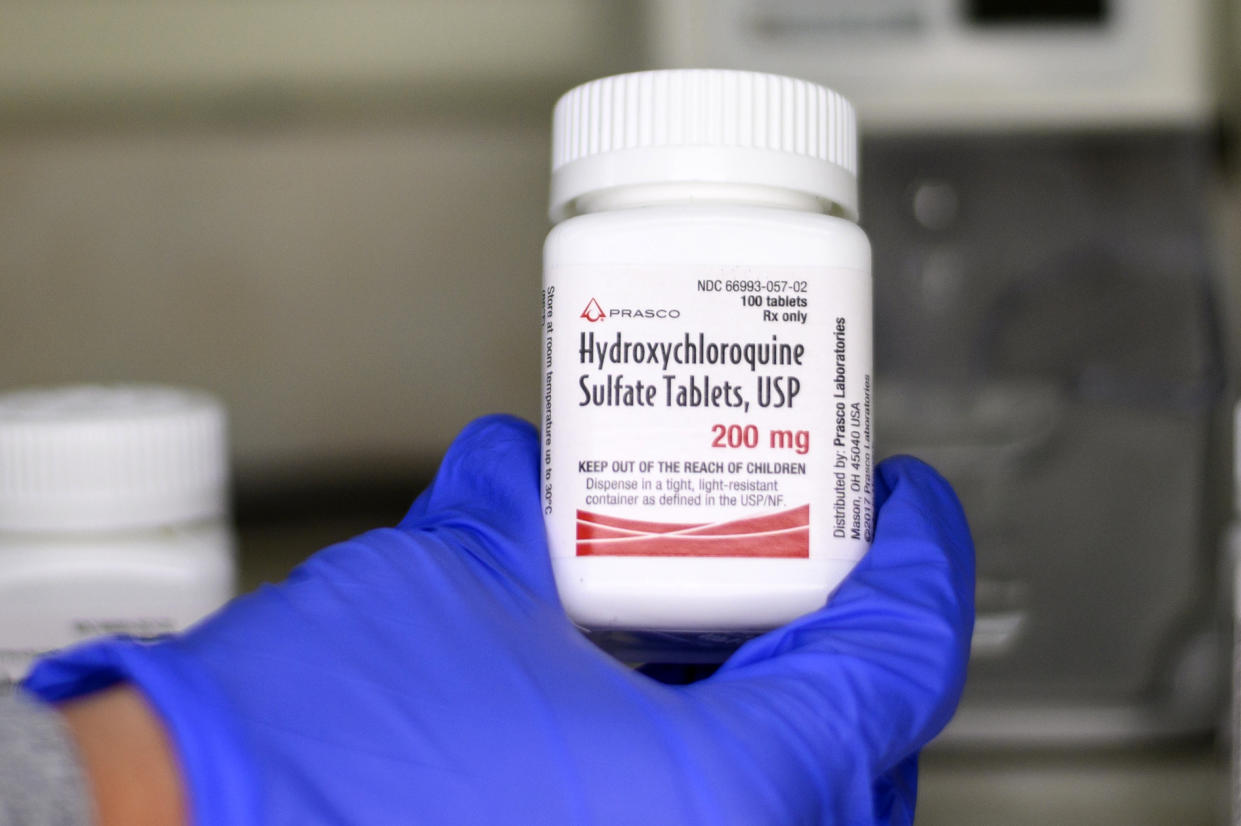Hydroxychloroquine expert suggests doctors should halt prescriptions for COVID-19 patients after 'concerning' study

It’s been just over two weeks since President Trump announced that his administration had ordered over 29 million doses of the antimalarial drug hydroxychloroquine (HCQ) as a treatment for coronavirus patients. But in a new preliminary report, doctors from the U.S. Department of Veterans Affairs found evidence of what experts have been warning about all along — that the drug may cause more harm than good.
The study, to be clear, was conducted on a small sample size and has yet to be peer-reviewed. But its results echo anecdotal evidence that has been building about the dangers of the drug. In it, researchers analyzed the medical records of 368 male patients with COVID-19 from March 9 to April 11, at which point the men had either been discharged or had died. Researchers found that the death rate of those who were not given the drug was 11.4 percent, while the death rate of those who were treated with hydroxychloroquine was 27.8 percent — more than double.
“An association of increased overall mortality was identified in patients treated with hydroxychloroquine alone,” the authors write. “These findings highlight the importance of awaiting the results of ongoing prospective, randomized, controlled studies before widespread adoption of these drugs.”
Dr. Chrisopher Plowe, a professor of global health at Duke University and a world-renowned expert on malaria drugs (including hydroxychloroquine), has been cautioning about prescribing the drug for weeks, telling Yahoo Life in an April 7 interview that “really serious cardiac issues,” including “potentially fatal cardiac arrhythmias,” can occur even with the first dose of the drug. Now, in the wake of new evidence, he talked to Yahoo Life about how the medical world should respond.
Yahoo Life: Let’s start with the study itself. What do you think about the death rate doubling among COVID-19 patients who were given hydroxychloroquine?
Dr. Christopher Plowe: It’s pretty concerning. But it’s a retrospective study, not a randomized clinical trial ... so they looked at patients’ outcomes and then determined who got these drugs. They did try to control for the clinical characteristics that the patients had when they came in, and so it’s certainly possible that the patients who were given the drugs were sicker and that could be one explanation for why they have more deaths. But it’s also quite likely that the drugs themselves account for that.
Given the study is not a randomized, controlled trial, should we still consider it an indication that this drug is potentially causing more harm than good?
This is another piece of evidence that I would say goes beyond anecdotal. This makes it all that much more clear — as it’s been pretty clear to some of us all along — that unless and until we have a proper randomized clinical trial, we’re speculating and going on our hunches. And that’s not a good way to decide how to treat people with a potentially fatal disease like COVID-19. We have to be very clear this doesn’t prove that these drugs have caused these deaths. But it certainly raises concern that use of [HCQ] may be contributing to the risk of death — without any clear evidence of benefit.
Given this, do you think clinicians should stop prescribing HCQ as a treatment for the coronavirus?
I do. With this evidence, I wouldn’t use it in anybody because [even] pretty good studies that we’re seeing are showing no significant benefit. And now this is yet another signal that we’re seeing fatal outcomes from using these drugs. So my recommendation to fellow clinicians based on this has shifted from, “Well, I would be pretty carefully using it and wouldn’t use it routinely” to “I would avoid prescribing these drugs for COVID-19 until we have the results of a clinical trial.”
As we’ve discussed in the past, President Trump and others in the White House extolled this drug early on, telling Americans it was having “profound” effects. Do you think those comments need to be walked back?
I do. I think the responsible thing would be to put out a very clear and unequivocal message that hydroxychloroquine may be dangerous and may increase the risk of death, and that those very optimistic, hopeful exhortations and comments should be walked back — not just from the White House, but from quite a few other public figures who’ve been making those statements.
Clinical trials are underway to test hydroxychloroquine (in combination with another drug, azithromycin). Are you optimistic about those results?
I fervently hope that the clinical trials show there is a benefit in at least some patients ... and that they are safe and they are effective. But until we have a definitive trial, we’re just guessing.
For the latest coronavirus news and updates, follow along at https://news.yahoo.com/coronavirus. According to experts, people over 60 and those who are immunocompromised continue to be the most at risk. If you have questions, please reference the CDC and WHO’s resource guides.
How to maintain your physical and mental health during the pandemic
Taking care of a loved one with COVID-19? Here’s how to stay healthy
Q&A with Dr. Kavita Patel: How to keep your family safe and maintain your mental health
Read more from Yahoo Life
Want daily lifestyle and wellness news delivered to your inbox? Sign up here for Yahoo Life’s newsletter.
